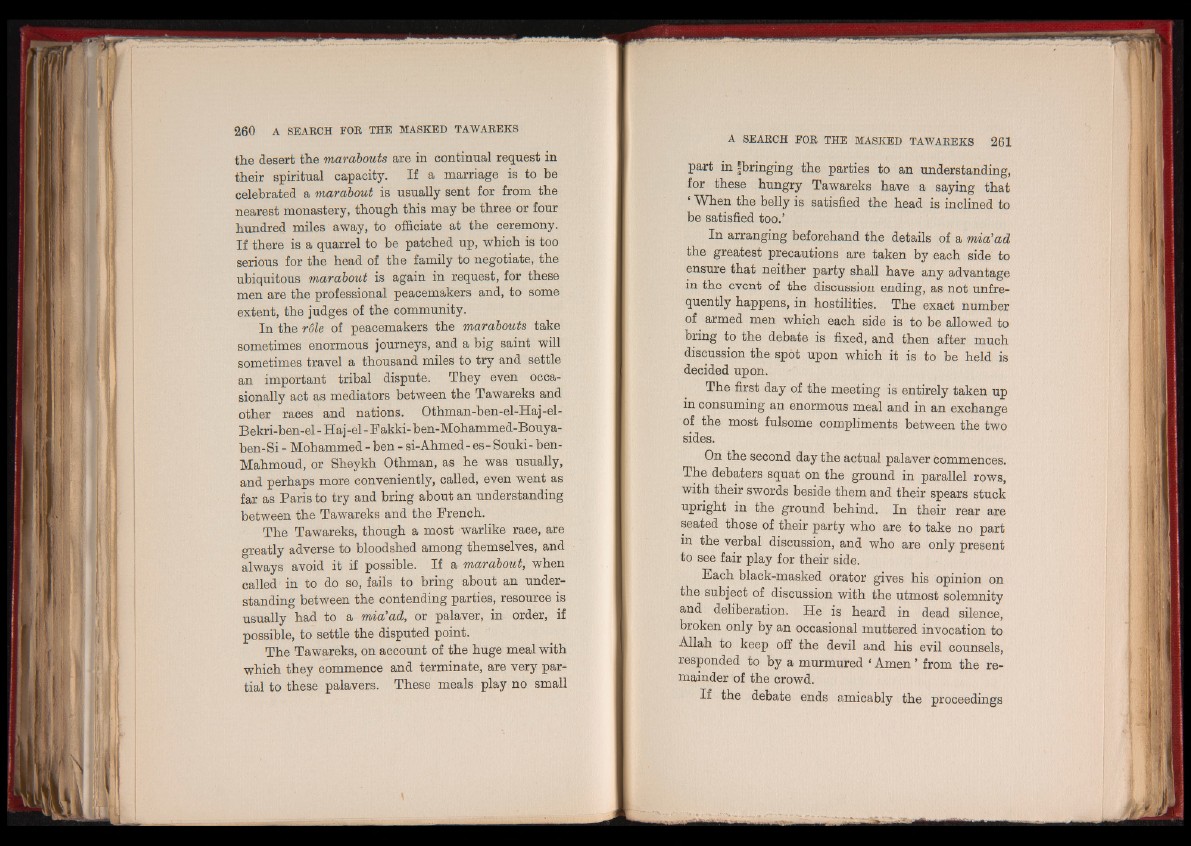
the desert the marabouts are in continual request in
their spiritual capacity. If a marriage is to be
celebrated a marabout is usually sent for from the
nearest monastery, though this may be three or four
hundred miles away, to officiate at the ceremony.
If there is a quarrel to be patched up, which is too
serious for the head of the family to negotiate, the
ubiquitous marabout is again in request, for these
men are the professional peacemakers and, to some
extent, the judges of the community.
In the rôle of peacemakers the marabouts take
sometimes enormous journeys, and a big saint will
sometimes travel a thousand miles to try and settle
an important tribal dispute. They even occasionally
act as mediators between the Tawareks and
other races and nations. Othman-ben-el-Haj-el-
Bekri-ben-el - Haj-el - Fakki- ben-Mohammed-Bouya-
ben-Si - Mohammed - ben - si-Ahmed-es- Souki- ben-
Mahmoud, or Sheykh Othman, as he was usually,
and perhaps more conveniently, called, even went as
far as Paris to try and bring about an understanding
between the Tawareks and the French.
The Tawareks, though a most warlike race, are
greatly adverse to bloodshed among themselves, and
always avoid it if possible. If a marabout, when
called in to do so, fails to bring about an understanding
between the contending parties, resource is
usually had to a mia’ad, or palaver, in order, if
possible, to settle the disputed point.
The Tawareks, on account of the huge meal with
which they commence and terminate, are very partial
to these palavers. These meals play no small
part in ¡bringing the parties to an understanding,
for these hungry Tawareks have a saying that
‘ When the belly is satisfied the head is inclined to
be satisfied too.’
In arranging beforehand the details of a mia’ad
the greatest precautions are taken by each side to
ensure that neither party shall have any advantage
in the event of the discussion ending, as not unfre-
quently happens, in hostilities. The exact number
of armed men which each side is to be allowed to
bring to the debate is fixed, and then after much
discussion the spot upon which it is to be held is
decided upon.
The first day of the meeting is entirely taken up
in consuming an enormous meal and in an exchange
of the most fulsome compliments between the two
sides. On the second day the actual palaver commences.
The debaters squat on the ground in parallel rows,
with their swords beside them and their spears stuck
upright in the ground behind. In their rear are
seated those of their party who are to take no part
in the verbal discussion, and who are only present
to see fair play for their side.
Each black-masked orator gives his opinion on
the subject of discussion with the utmost solemnity
and deliberation. He is heard in dead silence,
broken only by an occasional muttered invocation to
Allah to keep off the devil and his evil counsels,
responded to by a murmured ‘ Amen ’ from the remainder
of the crowd.
If the debate ends amicably the proceedings